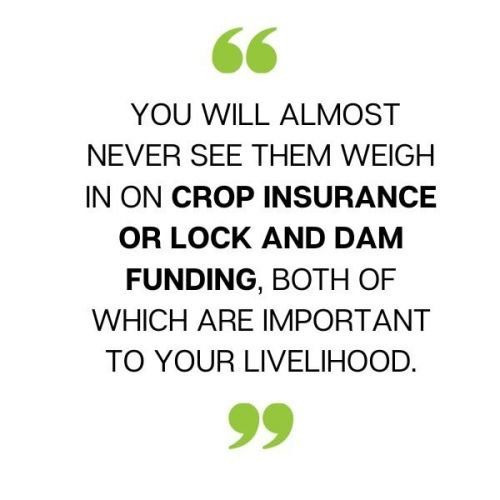Farmer First Voting Doesn’t Align with Right or Left Platforms

What makes up your identity?
I might introduce myself as a wife or a mother. I might call myself a Christian in some circles or identify as a farm kid in others. I probably include my county of residence to some and to others that I’m a University of Illinois alum. But only recently have I considered a new identifier – political party.
There’s no secret here. Your political identity has become a new, important way to show others who you really are and what you stand for. If you say you’re a republican, perhaps we assume that you’re worried about state and national debt, government overreach, and legal abortions. If introduce yourself as a democrat, you’re probably thinking about immigration, social programs, and gun control.
But what if you’re a farmer? What if the thing you’re worried about is your business and your family legacy? What if you were a farmer first and a republican or a democrat second?
Being a farmer first is going to make this political identity a bit trickier for you. Or, I should say, being a farmer first is going to make voting according to your political identity trickier. The thing is, if you’re voting as a farmer first, you’re voting for different candidates, right and left, because those candidates encourage agriculture and the business climate that supports agriculture.
Let’s take a closer look
- The largest market for Illinois commodities is the export market. One crucial element for vibrant export markets is infrastructure. Are you willing to vote for the candidates that vote for infrastructure? Locks and dams, rail lines and bridges all require funding and none of them fall along party lines. Are you willing to vote for agriculture to build the infrastructure that empowers your #1 market?
- Members of the IL Corn Growers Association consistently tell us that one of the most important aspects of their business is having a workable crop insurance program. Farm programs are no longer supported by both parties; in fact, support and opposition for farm programs fall on both sides of the party lines. Are you willing to vote for agriculture to preserve crop insurance?
- Protecting the ethanol market will make or break Illinois agriculture in the future. Although it might seem like every candidate – on both sides of the aisle – is looking towards electric vehicles, there are still candidates – on both sides of the aisle – that are supportive of ethanol, its clean energy benefits, and its boost to rural economies. Are you willing to vote for agriculture to build a future for renewable fuels?
Of course, our society is dealing with a hefty amount of important national issues. Maybe you are willing to be a one issue voter because you feel so strongly about abortion or gun control or immigration. However, each of us, having made the decision to be a one-issue voter, must recognize that we give something up. When we decide to be a one issue – or one platform – voter, we give up all the smaller issues, the ones that are close to home and have direct impacts on our businesses, our livelihoods, and our legacies.
National news networks and big-name candidates rarely cover agricultural issues. When you are watching your favorite political program, listening to a podcast, or following a pundit on social media, you will almost never see them weigh in on crop insurance or lock and dam funding, both of which are important to your livelihood. Farmer first voters must actively seek out the news that they require to be intelligent ag voters, either from associations they belong to, agricultural publications, or farmer experts.
It's difficult today to be a wise and intelligent voter. It takes effort and time and energy to look past what your news source is telling you and find the information important to you. And yet, that’s exactly what the founding fathers have called us to.
As we approach November 8, I’d encourage you to prioritize those elements of your identity that are the most important to you. Is your agricultural heritage and legacy towards the top? Are you hopeful to farm for the entirety of your career and pass the farm off to the next generation? Are you willing to vote for candidates that have proven their commitment to building a future for farmers in our state and our nation?
Agriculture, and the policies that support a booming ag economy, don’t fall along party lines. Farmer first voting isn’t right or left.







